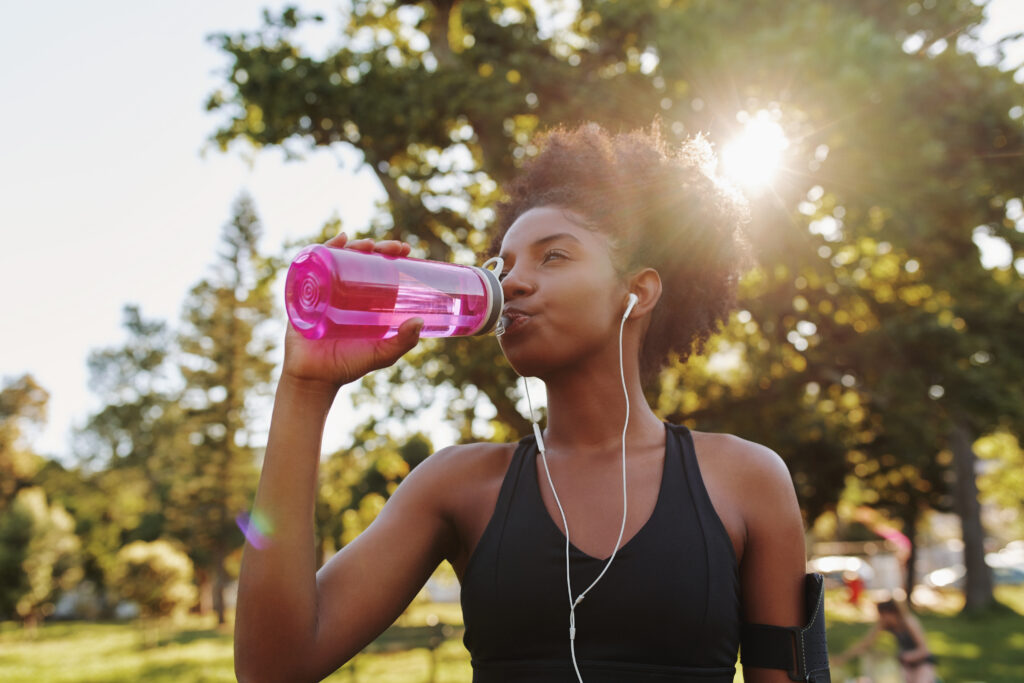Summer is an exciting time of the year that is typically filled with cookouts, outdoor activities and other events. However, the summer heat can be more than uncomfortable—it can be a threat to your health, especially for older adults and children. Whatever your age, don’t let the summer heat get the best of you.
Dehydration
Dehydration in the summer months can make you more susceptible to heat exhaustion and heatstroke. In the simplest terms, dehydration occurs when you lose more water than you take in. Staying hydrated is important to keep all your body functions running smoothly.
“Many times, the thirst mechanism is so weak that it is mistaken for hunger. Be sure to keep drinking water, even if it feels like you’ve just had a snack.”
To avoid symptoms of dehydration such as dizziness, weakness and fatigue, drink at least eight to 10 glasses of water throughout the day. The best overall approach is to make a conscious effort to stay hydrated, and continue drinking even if you don’t feel thirsty. In hot weather, skip coffee or soda, and make water your beverage of choice.
Heat Exhaustion
Heat exhaustion occurs when a person cannot sweat enough to cool the body, usually the result of not drinking enough fluids during hot weather. It generally develops when a person is playing, working, or exercising outside in extreme heat. Symptoms include:
- Dizziness, weakness, nausea, headache and vomiting
- Blurry vision
- Body temperature rising to 101 F
- Sweaty skin
- Feeling hot and thirsty
- Difficulty speaking
A person suffering from heat exhaustion must move to a cool place and drink plenty of water.
Heatstroke
Heatstroke is the result of untreated heat exhaustion. Symptoms include:
- Sweating
- Unawareness of heat and thirst
- Body temperature rising rapidly to above 101 F
- Confusion or delirium
- Loss of consciousness or seizure
Heatstroke is a serious medical emergency that must be treated quickly by a trained professional. Until help arrives, cool the person down by placing ice on the neck, armpits and groin. If the person is awake and able to swallow, give them fluids.
Tips For Staying Cool and Healthy This Summer
Below are some wellness tips to follow for a happy, cool and healthy summer.
Drink plenty of water. In hot weather, drink enough to quench your thirst. The average adult needs eight 8-ounce glasses of water a day, and even more during heat spells.
Watch what you eat at summer cookouts. Common cookout foods like burgers and hot dogs are full of fats that can make you feel lethargic. Sticking to lighter, more refreshing foods like fish, pasta salads and watermelon can give you more energy while still satisfying your appetite.
Protect yourself from the sun. Protect yourself from the harmfulness of UV rays by wearing protective clothing, staying in shaded areas during the sun’s highest points (from 10 a.m. to 4 p.m.) and using sunscreen with SPf of at least 15.
Dress for the weather. When outside, wear lightweight clothing made of natural fabrics and a well-ventilated hat.
Exercise safely outside. Exerting high amounts of energy in the heat raises your body temperature, making you more at risk for heat exhaustion and stroke. Make sure to drink lots of water, wear breathable clothing and have healthy snacks to fuel your body.
Stay inside if possible. Do errands and outside chores early or late in the day to avoid peak heat times.
Think cool. Take a cool shower or apply a cold compress to your pulse points. Try spending time indoors at an airconditioned mall or movie theater.
Take a vacation to prevent burnout. Reduced productivity, exhaustion and decreased engagement are all symptoms of burnout. Taking time away from your work responsibilities to get your mind and body in check is essential to keep up work performance and overall health. Learn more on how to secure your home while on vacation.
























